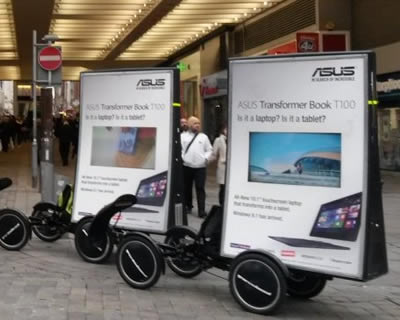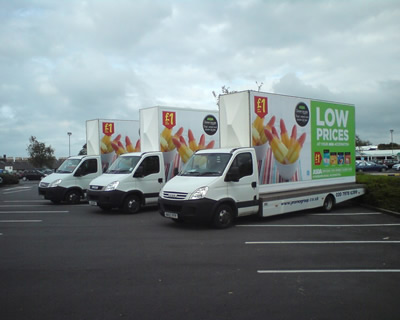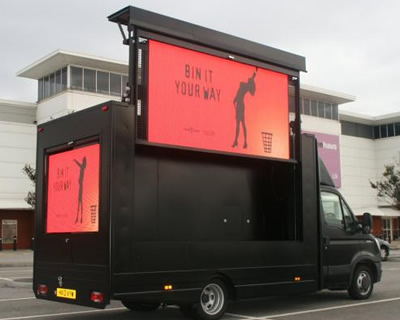Resources
- View costs
- Download our art specifications
- Download media packs for each of our products
- Promogroup over the years has developed and maintained a successful record of working with all types of advertising agencies
- View examples of the level of vehicle tracking we are able to undertake
- Carbon Offset Certificate
Responsible Operating Policy:
Promogroup's Terms and Conditions are attached to our Advertising Orders which we send out on each booking.
The ‘Company’ reserves the right to refuse too display any advertisement without giving any reason certainly if it contains sexual content, defamatory references, bad language or disturbing imagery.
Advertising material will not be accepted if, it is likely to offend any particular members or sectors of the public or in the opinion of the Company, the advertising material fails to conform to the UK Code of Non-Broadcast Advertising, Sales Promotion and Direct Marketing (CAP- Committee of Advertising Practice Code).
This Code is enforced by the Advertising Standards Authority (ASA). The full Code can be found on their website. Guidance is also taken from the Outdoor Media Centre’s ‘Policy and Production’ section.
Promogroup have full comprehensive insurance for all aspects of the business from Employees, Product and Public Liability. The business regularly updates its risk assessment program to make sure that all staff and operators are up to full speed on current legislation in the work and operating environment and have easy access to the Health and Safety Policy and Handbook.
As technology moves forward Promogroup believes in adapting its responsible operating policy and best practice to take into account the new digital formats that are on offer to clients and agencies such as the Digital Advans and Digital Adbikes.
Promogroup takes its guidance from the Outdoor Media Centre’s ‘Digital Large Format Roadside Code’ and endeavours in best practice to follow were possible ‘The Code’ below. This offers the closest example of digital operating practice that can be put in place for the Digital formats used by Promogroup:
Digital technology is changing the delivery of information. There are digital cameras, digital phones, digital television, digital radios, digital newspapers and now digital billboards.
Digital billboards will be one of the main growth areas for outdoor companies over the next few years as the industry seeks to adapt the old fashioned billboards for the digital era we are now in.
On billboards, digital technology still produces poster images but these are changed electronically via computer, hence no need for traditional billposting with ladders and vans or the paper and vinyl sheets on which the poster images are traditionally printed.
Digital technology is simply thus a new non-manual way to post billboard advertisements.
The use of modern technology to deliver images on to roadside mobile billboards allows not only useful commercial information to be dispersed to the general public, but enables police and government agencies to deliver speedy emergency information and quick communication to the public.
Typically at present a digital billboard advertisement is displayed for 6 to 8 seconds and then fades away. A new message then appears.
THE CODE
· Mirroring current roadside legislation, there shall be no moving images, animation, video or full motion images displayed unless consent has been granted for such displays.
· The advertising copy on digital roadside billboards should not change more frequently than every 5 seconds unless consent
has been granted for such displays
· The luminance level of a digital roadside billboard shall comply with the Institute of Lighting Engineers Technical Report no 5 (2003).
· Roadside digital displays in England will conform to the five 'Standard Conditions' specified in Schedule 2 of The Town and Country Planning (Control of Advertisements) (England) Regulations 2007, in Wales in Schedule 1 of The Town and Country Planning (Control
of Advertisements) Regulations 1992, in Scotland in Schedule 1 of The Town and Country Planning (Control of Advertisements) (Scotland) Regulations 1984. and in Northern Ireland in Schedule 1 of The Planning (Control of Advertisements) Regulations (Northern Ireland) 1992.
Promogroup when moving between locations in an urban centre always try to pause the images on the advertising vehicles or if rotation is necessary then restrict it to about every 10 seconds. Again when parked up in a roadside position the digital screens will rotate the messages approximately every 10 seconds.
If the content is full motion moving images such as video or animation then this will be best suited for display on private property such as retail parks and at organised events rather than roadside.
Promogroup as a responsible operator of outdoor advertising formats aims to create a safe and informative environment for both its staff and the public during the delivery of advertising or awareness information.
Promogroup Privacy Policy:
How we use your personal data
Providing your personal data to others.




















































































